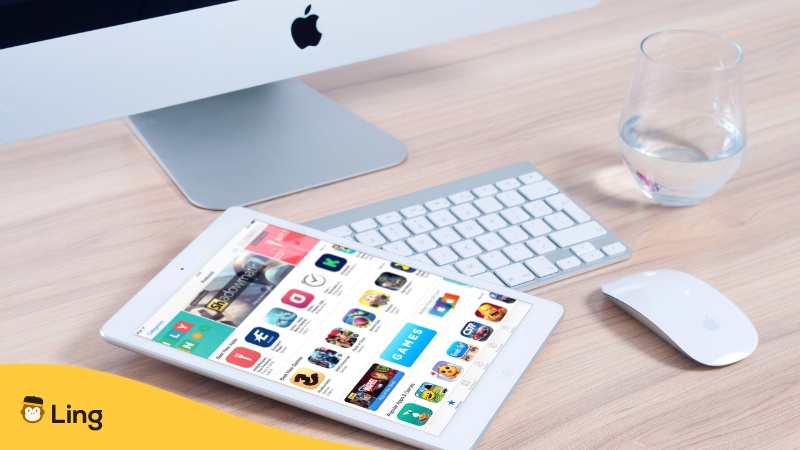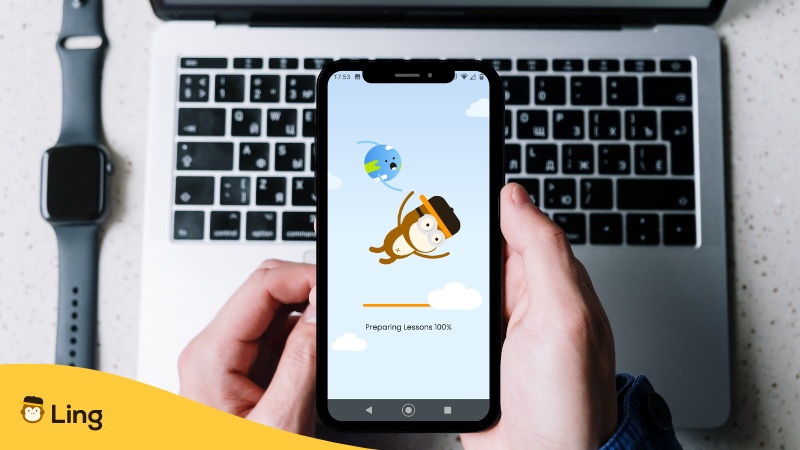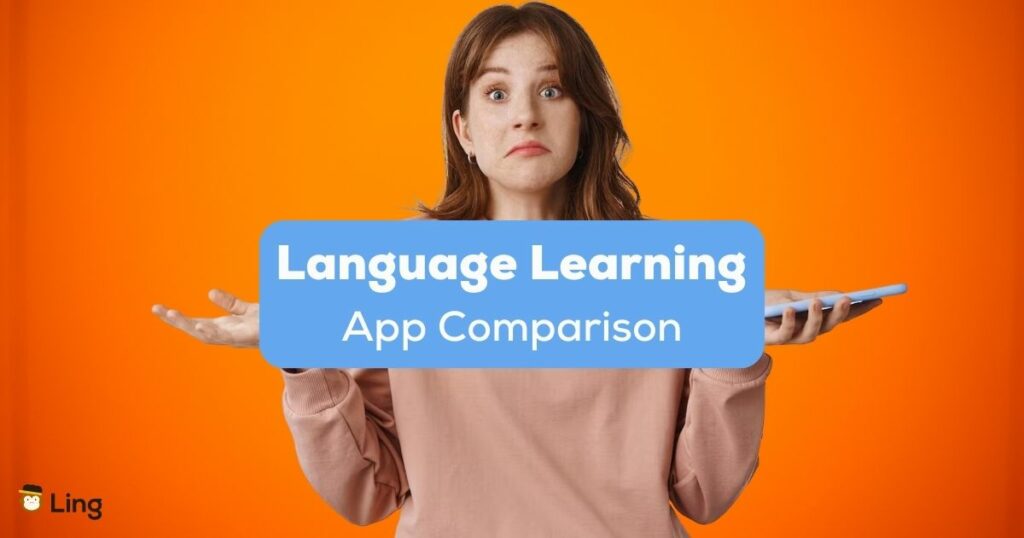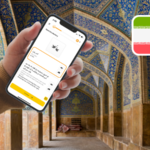When I first heard about language learning apps, I was skeptical. But then I came across a study from Michigan State University that changed my mind. Students used an app for 12 weeks, and believe it or not, they got better at speaking Spanish. Their grammar and vocabulary improved, too.
That’s why apps like the Ling app are worth looking at. But you’re probably asking, “Alright, but which app is the best for me?” That’s the million-dollar question, and it’s why I’ve crafted this language learning app comparison just for you. Stick around because we’re about to get into the specifics of each app, helping you find the perfect match for your language learning journey.
| App | Best For | Starting Price |
| The Ling app | Comprehensive Language Skills Development | $14.99/month |
| Rosetta Stone | Immersive Learning for Beginners | $15.99/month |
| FluentU | Real-World Contextual Learning | $29.99/month |
| Busuu | Personalized Learning Plans | $13.90/month |
| Lingoda | Live Teacher-Led Classes | $16/5 classes |
| Babbel | Grammar and Syntax Mastery | $ 9.60/month |
The Ling App: Best For Comprehensive Language Skills Development
Let’s start with the best language-learning app: the Ling app. This is a powerhouse, especially when it comes to its mini-games. Each game is meticulously designed to target a specific skill.
Take it from me, the “Word Order” game is a game-changer for understanding sentence structures. Unlike Rosetta Stone, which focuses more on immersive learning, the Ling app gives you a more hands-on approach to mastering syntax.
Another thing that sets the Ling app apart is its language offerings. Most apps in this language learning app comparison focus on popular languages like Spanish or French, but the Ling app goes the extra mile. It offers less commonly taught languages like Tagalog and Finnish.
And it doesn’t stop at just teaching words; it has a powerful AI chatbot that, paired with a speech recognition system, lets you practice your pronunciation in a stress-free environment.
Transform Your Language Skills in a Week – Get the Ling App Today!
The Ling App’s Standout Features
- Chatbot Conversations: The Ling app offers a chatbot feature that simulates real conversations. It’s a safe space to practice without fearing making mistakes, something you won’t find in Rosetta Stone.
- Leaderboard & Challenges: The app has a competitive edge with its leaderboard and daily challenges. It adds a fun element to learning, encouraging you to stay consistent.
- Review: The Ling app incorporates a feature that lets you review each unit’s content and vocabulary. This ensures you won’t forget what you learned!
What Are Users Saying About The Ling App?
- Google Play Rating: 4.7 stars with 11.5K reviews.
- Positive Feedback: People are raving about the Ling app’s mini-games, calling them “engaging” and “educational.” One user even said, “The games make learning so much fun; I almost forget I’m studying!” The app’s wide range of languages also gets a nod. Users appreciate the inclusion of less commonly taught languages, a unique offering in the language app world.
- Room for Improvement: Some users mentioned difficulty when finger-tracing foreign characters in the writing section, saying the app asks for perfect tracing. Perhaps a little more room for error could benefit learners, but it’s important to write each character correctly, too.
How Much Does The Ling App Cost?
- Free version with beginner lessons and an introductory chatbot.
- $14.99 per month for the Premium Version, with access to all lessons in 60+ languages and all features unlocked.
- $79.99 per year for the Premium Version.
- $149.99 for lifetime access (one-time purchase).
Devices: Android, iOS, web.
Rosetta Stone: Best For Immersive Learning For Beginners
Rosetta Stone is a well-known language-learning platform that’s been around for a while. They have an immersive learning approach that aims to teach languages in a natural way, as one learns their first language.
Rosetta Stone’s “Dynamic Immersion” method is one I often recommend for beginners. You’re shown a picture and then hear the word in your target foreign language. It’s a different approach than that of the Ling app, for example, which uses mini-games to teach.
But Rosetta Stone takes it up a notch when compared to FluentU. Its patented speech recognition engine, “TruAccent,” listens to your pronunciation and gives immediate feedback with a waveform so you can match the pitch and tone. FluentU may be excellent for contextual learning, but it doesn’t offer this level of pronunciation analysis.
Rosetta Stone’s Standout Features
- Simulated Conversations: The app offers simulated conversations to practice speaking in a controlled environment, which makes for a more interactive experience.
- Short Lessons: The app’s bite-sized 10-minute lessons are perfect for learners with busy schedules and are even personalized for your fluency level.
- Stories: Rosetta Stone has a ‘Stories’ feature where you can listen to stories in your target language. This helps improve your listening skills and vocabulary.
What Are Users Saying About Rosetta Stone?
- Google Play Rating: 4.7 stars with 375K reviews.
- Positive Feedback: Users often highlight Rosetta Stone’s immersive approach. “It’s like I’m not just learning words. I’m learning how to think in a new native language,” one user mentioned. The TruAccent feature also gets a lot of love for its real-time feedback on pronunciation.
- Room for Improvement: Some language learners find the app a bit pricey and wish for more affordable options. “It’s effective but expensive,” a reviewer noted. A user also mentioned that the app could be more customizable to his learning style.
How Much Does Rosetta Stone Cost?
- 3 months for $47.97 ($15.99 per month).
- One year for $126 ($10.50 per month).
- Lifetime access for $199.
Devices: IOS, Android, and Web.

FluentU: Best For Real-World Contextual Learning
Speaking of FluentU, this app is unique in its approach. In it, you get real-world videos, such as music videos and movie trailers, that come with interactive captions. You can click on a word, and you’ll get an instant definition, native pronunciation, and visual learning aids. It’s a feature I’ve found to be incredibly effective for retention.
Something that sets FluentU apart from, say, Busuu, is an algorithm that tracks your learning. It suggests videos that use words you struggle with. Busuu, on the other hand, is more about personalized learning plans and peer-to-peer interaction.
FluentU’s Standout Features
- Flashcards: FluentU also offers flashcards, which are auto-generated from the words you encounter in videos. It’s a more personalized approach.
- Language in Context: FluentU’s method means you’ll learn from authentic videos that show real-life language usage.
- Course Mode: This feature balances free exploration and guided learning, which allows you to follow a structured learning path.
What Are Users Saying About FluentU?
- Google Play Rating: 4.1 stars with 3.82K reviews.
- Positive Feedback: FluentU’s real-world videos are a hit. “It’s like YouTube but for language learning,” said one user. The interactive captions also receive praise for making vocabulary retention easier.
- Room for Improvement: Some learners mentioned that the user interface could be more intuitive. Others wish the app had more languages available. “Wish they had more options like the Ling app,” one user commented.
How Much Does FluentU Cost?
- Free 14-day trial.
- Monthly subscription: $29.99
- Yearly subscription: $143.99
Devices: Android, iOS, web.
Busuu: Best For Personalized Learning Plans
Busuu is all about customization. Unlike FluentU, which uses an algorithm to suggest content, Busuu starts you with a placement test.
Based on your score, the app creates a personalized study plan. It estimates how many hours you need to reach your next language milestone.
But the real kicker is Busuu’s “Conversations” feature. You can submit written or spoken exercises, and native speakers in the Busuu community will correct you.
You can also find this peer-to-peer interaction in Lingoda, but Busuu focuses more on teacher-led classes.
Busuu’s Standout Features
- Vocabulary Trainer: This feature allows you to review and practice vocabulary separately from lessons, making it easier to focus on your weak spots.
- Exercises: The app offers plenty of interactive exercises, such as reordering sentences, dictation, multiple choice questions, and filling in the blanks.
- Official Certificates: Busuu offers McGraw-Hill Education language certificates, adding formal recognition to your learning journey.
What Are Users Saying About Busuu?
- Google Play Rating: 4.7 stars with 683K reviews.
- Positive Feedback: The personalized learning plans are a standout feature. “The placement test really nailed my skill level,” one user said. The peer-to-peer interaction also gets positive mentions for making the learning experience more interactive.
- Room for Improvement: Some users wish for a more extensive vocabulary section. “The app is great for conversation but lacks vocabulary” was a common sentiment.
How Much Does Busuu Cost?
- Free version with basic language learning features.
- Premium subscription for one month: $13.90
- 6 months: $83.40
- 12 months: $166.80
Devices: Android, iOS, web.

Lingoda: Best For Live Teacher-Led Classes
Lingoda offers something most apps can’t: live, teacher-led classes. These aren’t pre-recorded. They’re real-time lessons where you can interact with the teacher.
Compared to Busuu, which is more self-paced, Lingoda gives you that classroom discipline, making it ideal for those who prefer a structured learning environment.
What’s more, Lingoda offers “Sprint” courses that promise to make you fluent in three months. These intensive courses require a substantial time commitment, but the results are worth it.
It’s an approach I often recommend for those serious about language mastery, especially compared to Babbel’s more rule-focused method.
Lingoda’s Standout Features
- Group Classes: Besides one-on-one lessons, Lingoda offers group classes, allowing you to interact with other learners.
- Personal Homepage: Lingoda has a feature called “The Today Page,” which adapts to your particular progress and plan, giving you options such as joining classes or finding resources.
- Curriculum Downloads: Lingoda provides downloadable materials for each class so you can review them later.
What Are Users Saying About Lingoda?
- Trustpilot Rating: 4.4 stars with 5K reviews.
- Positive Feedback: Users love the live, teacher-led classes. “This is my personal instructor on my phone,” one user gushed. The Sprint courses also get a thumbs up for their intensive, results-driven approach.
- Room for Improvement: Some users find the time commitment for the Sprint courses to be much longer. “It’s effective but intense,” one user noted.
How Much Does Lingoda Cost?
Lingoda’s prices vary depending on the language you’re learning, but here are their current rates:
- Group classes:
- 5 classes: $16-$23
- 12 classes: $13.50-$19
- 20 classes: $11.50-$17.50
- 40 classes: $10.50-$15.50
- Individual classes:
- 5 classes: $37-$48
- 12 classes: $30-$38.50
- 20 classes: $25-$34
- 40 classes: $22.50-$30
- Language sprints:
- Super Sprint (60 classes in 2 months): $796
- Sprint (30 classes in 2 months): $510
Devices: Web platform.
Babbel: Best For Grammar And Syntax Mastery
Babbel has a systematic approach to language learning, making it perfect for those who love rules.
While Lingoda focuses on live classes, Babbel starts each lesson with a dialogue between native speakers. Then, it breaks down the grammar and syntax used in that dialogue.
The app also keeps track of the words you’ve encountered, and when you should review them, with its “Review Manager.”
What’s more, it uses spaced repetition to improve retention. This feature is similar to FluentU’s algorithm but focuses more on structured learning.
Babbel’s Standout Features
- Dialogue Trainer: Babbel offers a dialogue trainer that allows you to practice real-life conversations.
- Conversational Approach: The platform aims to allow users to have real-life conversations right from the start. This means they focus on more practical language.
- Voice Recognition: Similar to Rosetta Stone’s TruAccent, Babbel also provides voice recognition to improve your pronunciation.
What Are Users Saying About Babbel?
- Google Play Rating: 4.7 stars with 957K reviews.
- Positive Feedback: Babbel’s structured lessons are a hit. “I love how each lesson builds on the last,” said one user. The app also gets praise for its effective use of spaced repetition with the Review Manager.
- Room for Improvement: Some users mention technical issues on Android devices. “Wish all the lessons were functional,” a user pointed out. Others find the frequent updates disruptive.
How Much Does Babbel Cost?
- Free version with access to the first lesson in every course.
- 1 month (one language): $9.60
- 3 months (one language): $28.80
- 12 months (one language): $115.20
- Lifetime (all languages): $319
Devices: Android, iOS, web.

Why Should You Use Language Learning Apps?
Let’s be real, language learning can be quite a challenge sometimes, so anything that can help make the process smoother is welcomed. As such, language-learning apps’ features like gamification, short lessons, and vocabulary and pronunciation practice can be a godsend.
Many of these apps, like Rosetta Stone, have quick lessons for when you don’t have a lot of time. Others, like Lingoda, have one-on-one lessons that are perfect for profound learning. Some, such as the Ling app, even have an AI chatbot that lets you practice your conversation skills.
What’s more, another advantage of this type of learning is that you can study wherever you are. Since most of these apps have mobile versions, you can take them with you when you’re on the move, and features such as offline access and audio downloads only add to their usefulness.
What Do You Think Of Our Language Learning App Comparison?
We’ve laid it all out for you—the good, the bad, and the uniqueness of each app. Now, it’s your turn. What do you think of our language learning app comparison?
Did it help you make a more informed choice? I’ve filtered through user reviews, dissected features, and compared the best language learning apps head-to-head to give you the most comprehensive guide.
But let’s cut to the chase. If you’re looking for an all-encompassing language learning experience, you might want to consider the Ling app. It’s not just another app on the list. It’s a holistic approach to language learning. So, go ahead and download the Ling app from Google Play or the App Store.
And if you’re into language nuances and cultural tidbits, our daily language articles are just a click away. They’re your go-to resource for grammar lessons and cultural insights. Give them a read; you won’t be disappointed.































































